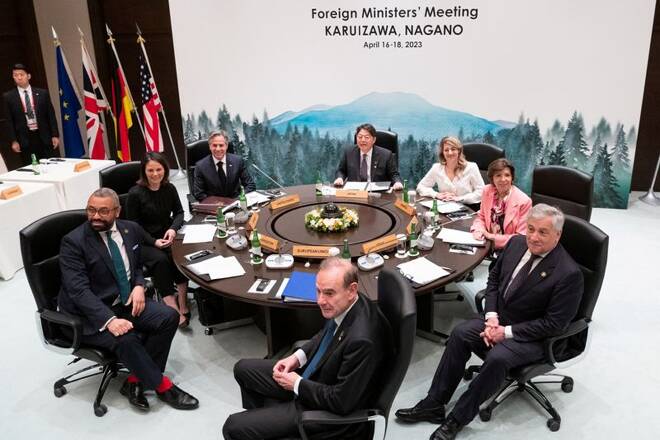Advertisement
Advertisement
G7 ministers stress unity amid tensions with China and Russia
By:
TOKYO (Reuters) - Foreign ministers from the Group of Seven rich nations on Tuesday G7 condemned Russia's "irresponsible nuclear rhetoric" as "unacceptable" and called on China to act as a responsible member of the international community.
By Humeyra Pamuk and Sakura Murakami
KARUIZAWA, Japan (Reuters) -The Group of Seven industrial powers drew together on Tuesday to criticise China’s coercion of Taiwan and Russia’s threat to station nuclear weapons in Belarus, promising to intensify sanctions on Moscow for its war on neighbouring Ukraine.
“The strength of the solidarity between the G7 foreign ministers is at a level not seen before,” Japan’s Foreign Minister Yoshimasa Hayashi said at a news conference after hosting a meeting of the group in the Japanese resort town of Karuizawa.
The show of unity comes after French President Emmanuel Macron this month said the European Union should reduce its dependency on the United States and cautioned against being drawn into a Taiwan crisis.
Beijing views Taiwan as Chinese territory and has not renounced the use of force to take the democratically governed island.
The G7 communique highlights how the dual issues of Russian military intervention and fears of similar action by China against Taiwan have been a focus of the three-day meeting.
The group, which comprises the United States, Japan, Germany, Britain, France, Italy and Canada, described Russia’s threat to put nuclear weapons in Belarus as “unacceptable”. It said “any use of chemical, biological or nuclear weapons in Ukraine “would be met with severe consequences.”
Russian President Vladimir Putin last month said Russia would station shorter-range, so-called tactical nuclear weapons because the NATO military alliance was expanding towards Russia’s borders.
It was the first time since the Cold War ended three decades ago that Russia has suggested stationing nuclear forces in another country, raising the stakes in its intensifying standoff with the West over Ukraine.
In a bid to limit Moscow’s ability to wage its war, the G7 ministers in their communique also warned other nations, which the U.S. and other Western nation worry could include China, not to supply Russia’s armed forces.
“We will reinforce our coordination to prevent and respond to third parties supplying weapons to Russia,” they said.
U.S. Secretary of State Antony Blinken last month said China had not yet supplied Russia with lethal aid, but U.S. officials are also concerned about dual-use products, such as electronics components that can be used in missiles and other weapons.
In a news conference after the G7 meeting, Blinken criticised Russia after a days-long pause in the inspection of ships moving grains from Ukraine under a U.N.-brokered initiative. Russian media on Tuesday reported inspections had restarted.
Taking direct aim at China, the ministers also agreed that peace and security in the Taiwan Strait was critical and opposed militarisation of the South China Sea. They called on Beijing to act.
“We remind China of the need to uphold the purposes and principles of the UN Charter and abstain from threats, coercion intimidation and the use of force,” the ministers said in the document, which also included a condemnation of North Korea’s missile launches and expressed concerns about Myanmar, Afghanistan and Iran.
(Reporting by Sakura Murakami and Humeyra Pamuk; Writing by Tim Kelly; Editing by David Dolan and Lincoln Feast)
About the Author
Reuterscontributor
Reuters, the news and media division of Thomson Reuters, is the world’s largest international multimedia news provider reaching more than one billion people every day. Reuters provides trusted business, financial, national, and international news to professionals via Thomson Reuters desktops, the world's media organizations, and directly to consumers at Reuters.com and via Reuters TV. Learn more about Thomson Reuters products:
Did you find this article useful?
Latest news and analysis
Advertisement
